Key takeaways:
- Audio news aggregators enhance information consumption by curating diverse perspectives, saving time and fostering personalization.
- Reliable news aggregation promotes critical thinking by exposing users to varied viewpoints, facilitating informed discussions about complex issues.
- Key features of effective audio news aggregators include a variety of source content, user-friendly navigation, and strong personalization options.
- Fact-checking and recognizing emotional narratives in news coverage are essential for informed civic engagement and understanding diverse opinions.
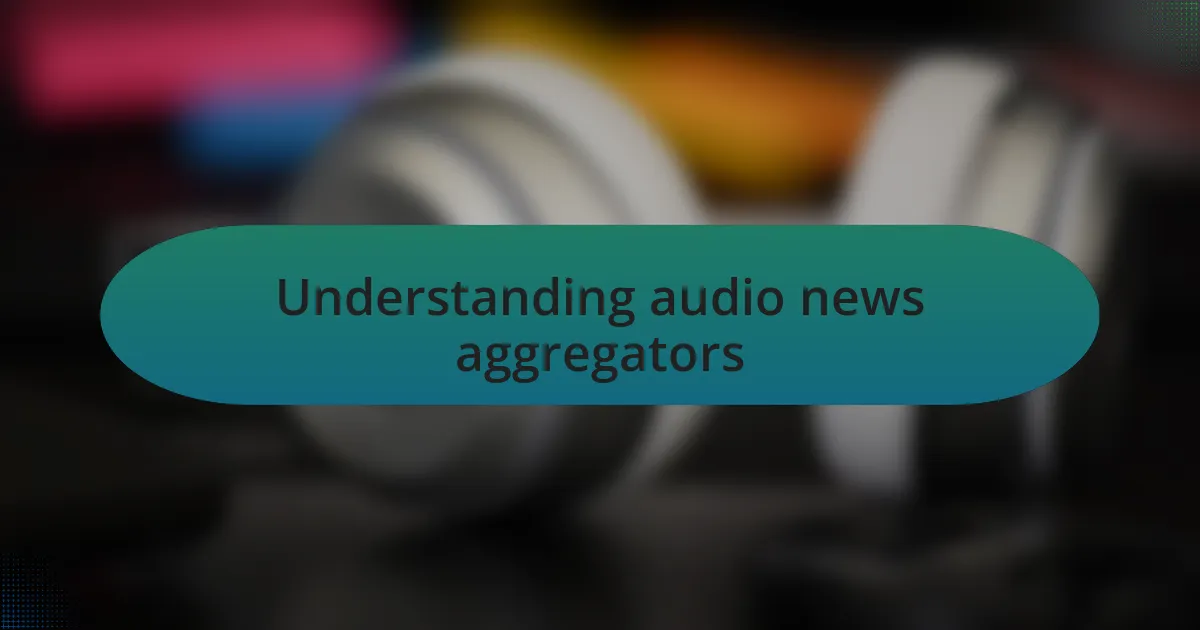
Understanding audio news aggregators
Audio news aggregators have revolutionized the way we consume information, don’t you think? I recall the first time I stumbled upon one; I was juggling my morning routine and found myself captivated by diverse perspectives on the latest news, all delivered through my earbuds. It made me realize how these platforms curate multiple sources, saving time while keeping us informed.
What I appreciate most about audio news aggregators is their ability to tailor content based on our interests. Once, during a hectic day, I simply mentioned to my app what I wanted to hear, and it delivered a perfectly curated selection. This made me wonder: how did we ever live without this level of personalization?
These platforms also provide an intimate experience, almost like having a conversation with a well-informed friend. I often find myself reflecting on the emotional weight of the stories shared, and it’s a reminder of how critical it is to stay connected with the world around us. Isn’t it fascinating how a simple audio clip can spark such deep thought and engagement?
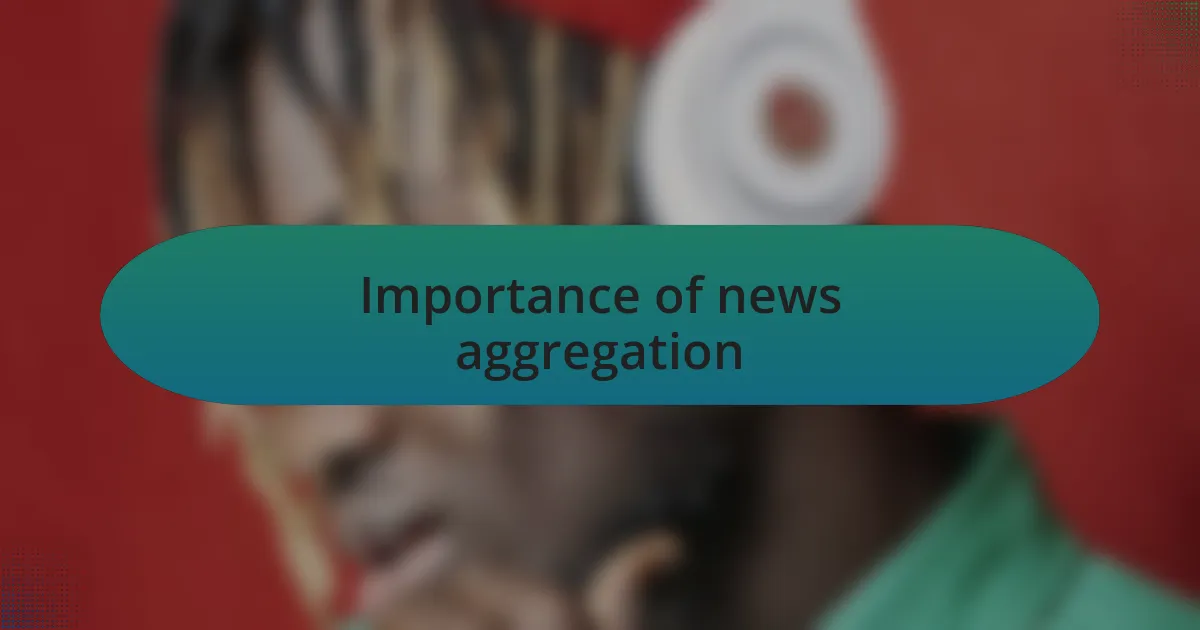
Importance of news aggregation
Reliable news aggregation serves as a crucial bridge in our information landscape, especially during pivotal moments like elections. I remember experiencing the intensity of election night; with so many outlets vying for my attention, it was my aggregator that helped me cut through the noise. It provided a clear, cohesive view of events, allowing me to focus on the essential updates without feeling overwhelmed.
Moreover, news aggregators not only streamline our access to information but also expose us to varying viewpoints, enriching our understanding of complex issues. I vividly recall switching between different audio segments during a significant political debate, which illuminated perspectives I hadn’t considered before. Have you ever noticed how diverse voices can shift our perception of the same event?
This multifaceted approach to news consumption promotes critical thinking and informed discussions. One evening, as I listened to contrasting analyses of a candidate, I found myself engaged in a lively chat with friends, eager to share my newfound insights. It struck me how aggregators don’t just deliver news—they foster dialogue and encourage us to think more deeply about our choices in an ever-evolving landscape.
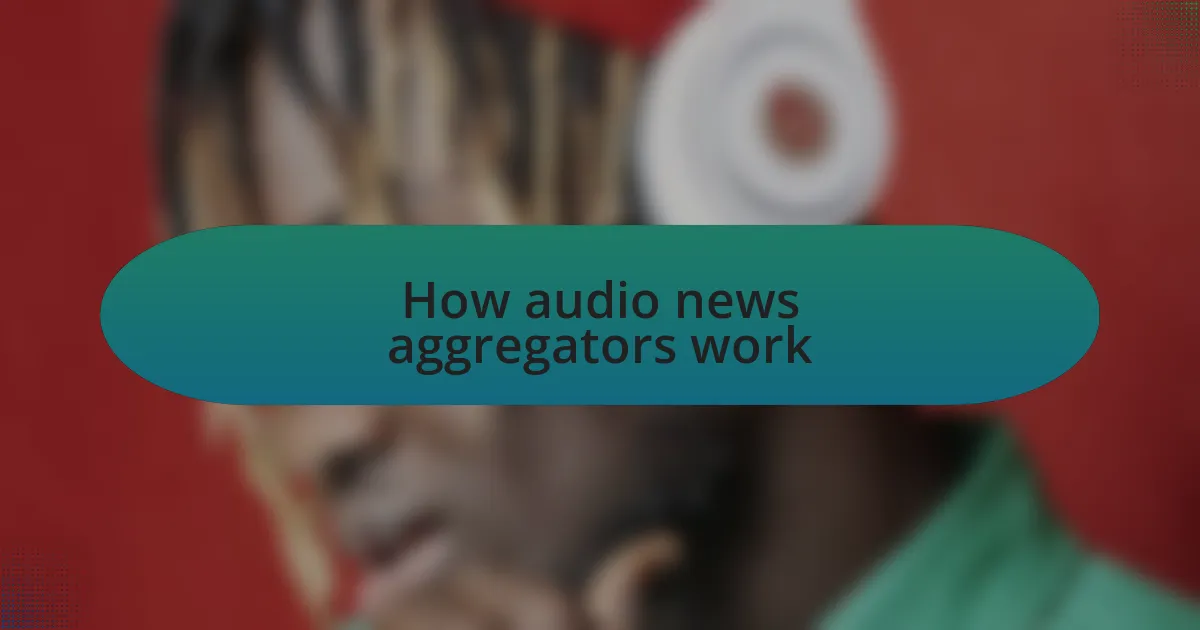
How audio news aggregators work
Audio news aggregators function as automated tools that curate content from various sources, tailoring it to individual user preferences. I remember the first time I used one; it felt like having a personal assistant that knew exactly what kind of stories would catch my interest. By tracking my listening habits and feedback, the aggregator learns to serve up segments that resonate, which is not only convenient but also quite fascinating.
These platforms employ algorithms to analyze audio content, which helps them identify trending topics and popular segments. I found this particularly helpful during the election, as I could hear real-time updates that were relevant to my interests. Have you ever felt a rush of excitement listening to breaking news discussed in ways that felt just right for you? That’s the magic of aggregation—keeping you connected to the pulse of ongoing events.
Moreover, audio news aggregators often allow for customization, letting users create playlists or select specific news categories. I vividly recall adjusting mine to prioritize election updates, and it paid off. Not only was I informed, but I enjoyed the experience of curating my own news journey. This user-centric approach makes the process of staying updated far more engaging, transforming what could be a mundane task into an active exploration of current events.
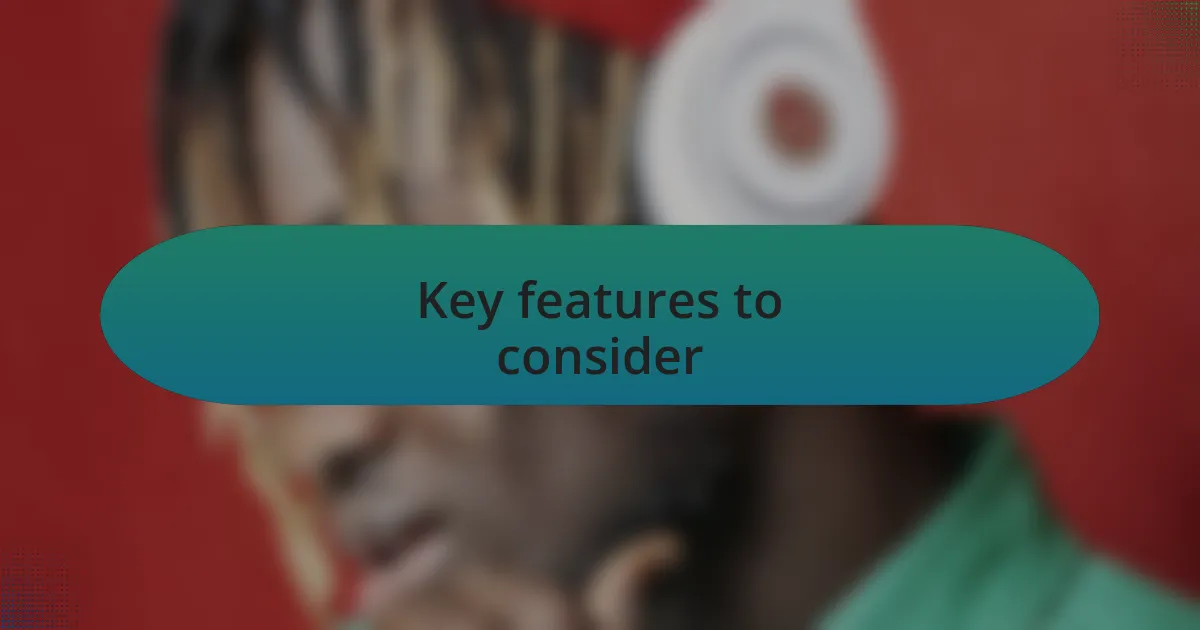
Key features to consider
When selecting an audio news aggregator, one key feature to consider is the variety of sources it includes. I remember the first time I stumbled upon a platform that sourced content from both major news networks and independent podcasts. It really opened my eyes to different perspectives on news stories, especially during the election season. Have you ever found yourself craving diverse viewpoints? That blend of sources made my listening experience not only richer but also more insightful.
Another essential feature is the ease of navigation within the app. I’ve had experiences with platforms that were cluttered and confusing, leaving me frustrated instead of informed. A simple, intuitive interface allows me to quickly access the updates that matter most. Isn’t it much more pleasant to use tools that respect your time? I’ve certainly appreciated those aggregators that understand the importance of user-friendly design, particularly when I was eager to catch the latest election results.
Lastly, personalization is a game-changer in audio news aggregators. When I could set preferences for political content or notifications for specific candidates, it felt like the app was tailor-made just for me. Remembering those moments when I’d receive an alert about a breaking news story was thrilling. Have you ever wished for an app that felt like it was listening to your interests? This thoughtful customization ultimately makes staying informed not just accessible but exciting.
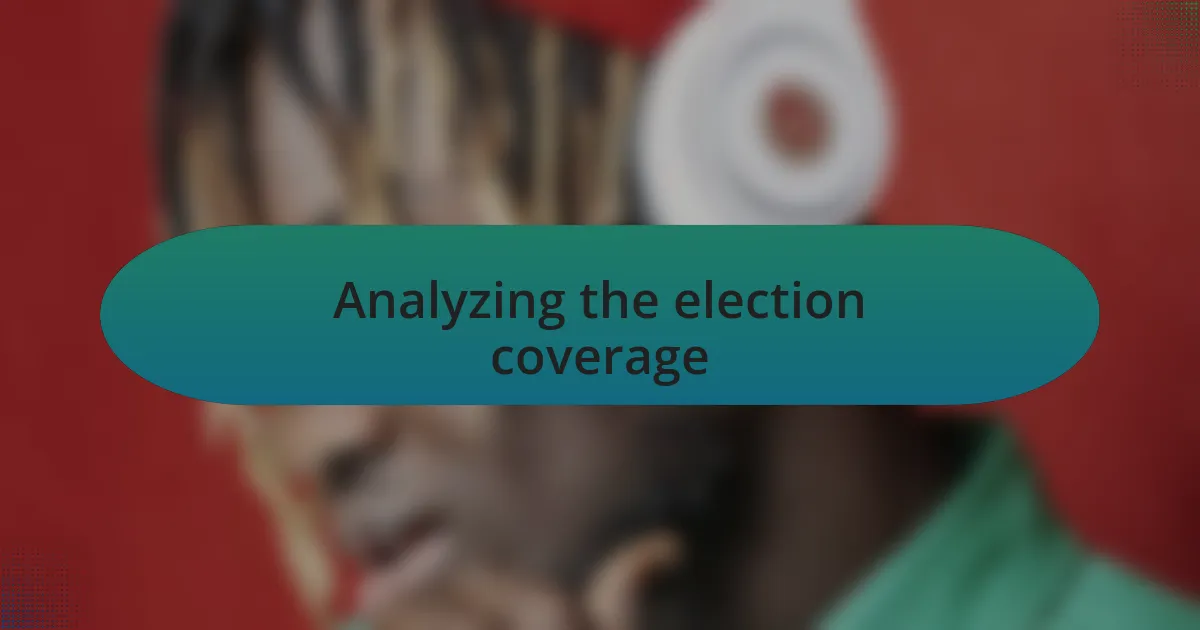
Analyzing the election coverage
The election coverage I observed was a mixed bag, with some outlets providing in-depth analysis while others raced to deliver breaking news. I remember tuning into a podcast episode just as a major announcement dropped; the host’s real-time reaction made the moment feel more immediate. Have you ever experienced that adrenaline rush during a live update?
One thing that stood out to me was the way different platforms framed the same events. I’d switch between traditional news outlets and more grassroots voices, and it was fascinating to see how language shaped narratives. This got me thinking—does the choice of words in reporting influence our perceptions as voters? I found myself reassessing my opinions based on varying interpretations of the same facts.
Additionally, the role of fact-checking during the election was more crucial than ever. I remember listening to a segment that dissected misleading claims from both sides, highlighting the importance of accuracy. It raised a vital question for me: how well do we hold ourselves accountable for the information we consume? These moments reminded me that being an informed voter isn’t just about hearing the news; it’s about critically engaging with it.
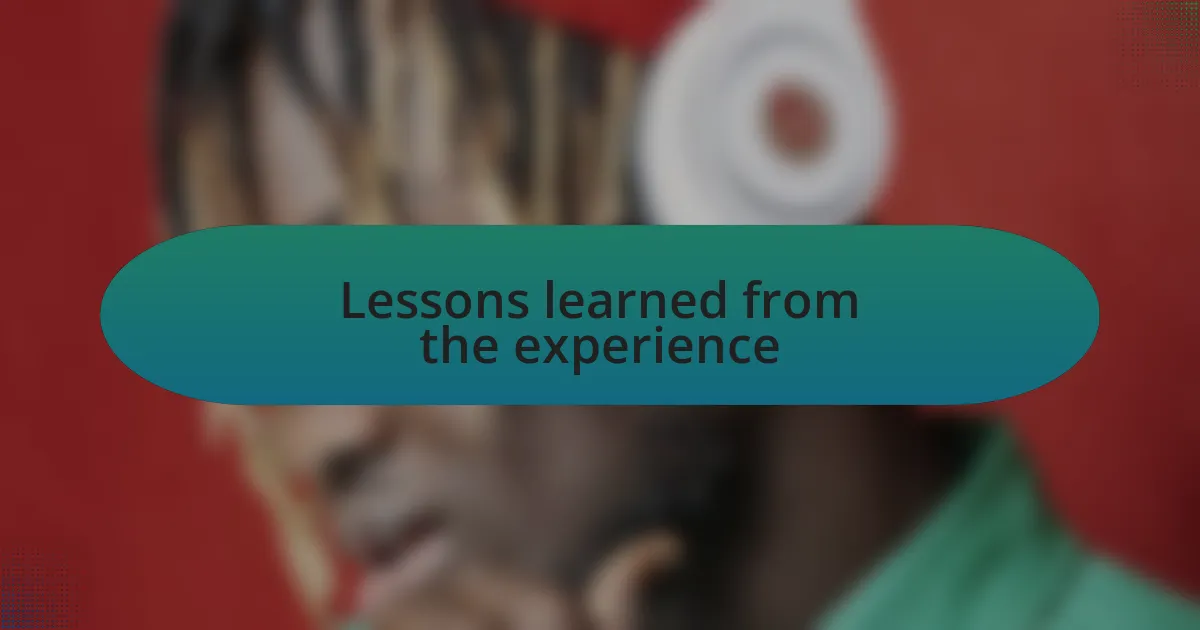
Lessons learned from the experience
Having watched the election unfold, one key lesson I learned is the immense power of perspective. I recall tuning into a local radio station that offered insights from community leaders, which enriched my understanding of issues often overshadowed by mainstream narratives. This contrast made me wonder how many voices we overlook—what insights might we gain by empowering more diverse opinions in our political discourse?
Fact-checking revealed itself as not just an afterthought, but a vital part of my viewing experience. I remember feeling a surge of frustration during a segment that fact-checked outrageous claims that had circulated widely online. It struck me that I had a responsibility to question and verify information before forming my opinions. How often do we blindly accept information? Each time I took a moment to fact-check, I felt more confident in my decisions, reminding me that diligence is a hallmark of a savvy voter.
Finally, I became acutely aware of the emotional undercurrents in election coverage. I experienced a wave of solidarity while listening to voters share their stories, which reminded me that politics isn’t just about the numbers—it’s about real lives and experiences. This emotional connection had me reflecting on how empathy plays a crucial role in our civic engagement. When we recognize the humanity behind the headlines, do we not become more invested in the outcomes?